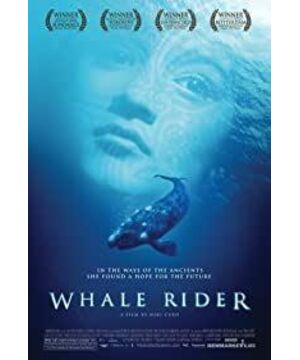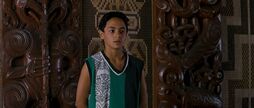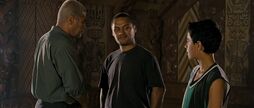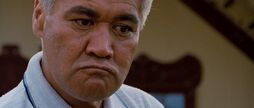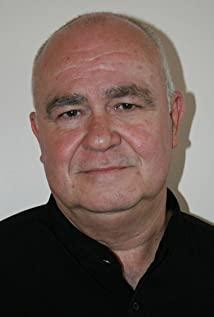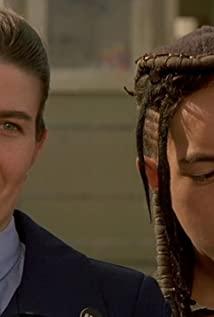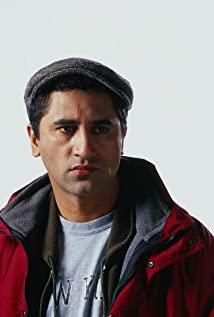The sea, where all life on this planet originated. Therefore, it is not a simple geographical concept, but a living body with biological characteristics: the blue-skinned sea giant has an ancient and full life, an endless rhythm of primitive life.
Whales, with mysterious habits, make all things small and extremely small. It migrates, sings, chooses suicide, and drowns alone in an ocean where no other mammal lives. The powerful sense of "the other side" in its soul is shocking and respectful.
And the end of this shock and respect is myth and worship. In ancient my country, riding a whale was likened to a wandering immortal: for example, "a deer rides a deer in the sky, and a whale rides far away in the East China Sea." Among the Maori people in Rotorua, New Zealand, there is even a myth and legend of "whale riding".
"Whale Rider" tells the story of a little Maori girl who grew up when she was not expected, rescued the stranded whale with wisdom, courage and leadership, broke the tradition of the chief's monopoly by men and the fate of the disaster star, and became the heir of the chief.
The emotions between grandfather and grandson in the film are full of contradictions and conflicts. As a grandfather, Ke Luo loves this wise granddaughter Pai Kaia; but as a chief who is looking for a successor who will lead his clan to overcome difficulties, all he wants is the eldest son, the eldest son of the eldest son.
When Colo learns that his eldest son has decided to settle in Germany to concentrate on art, his disappointment with Paikea turns to resentment. He refuses to go to school to pick up Pai Kaia, and decides to teach the boys traditions of the tribe in order to choose the best heirs. Paikea is not among them.
The sensitive Paikaya was hurt by her grandfather's heartlessness, but she understood his responsibilities and difficulties. I feel sorry for my granddaughter's grandmother, and asked her to learn traditional skills from her uncle. It turns out that she is not the only one who has the character of a chief but is not expected.
"If you want to have a whale's tooth, you must have a whale's mouth to accommodate it." If the assessment of the chief's heir disappointed Ke Luo, then facing the ineffective rescue of the stranded whale group made Ke Luo despair. And when everyone was about to give up, the whale-riding man turned the tide.
Paikea on the back of the whale, fearless, dedicated his life and death to love and faith. When grandma gave the whale tooth to Ke Luo, he finally realized that Paikaya was what he was looking for. Stubborn, he regretted: "I'm really a fledgling bird."
Ke Luo's practice of breaking the hereditary system to find the heir to the chief shows his public will to revitalize the tribal culture. This kind of character is reflected in Kaia's understanding of his grandfather. And Paikaya's mission to break through sexism teaches everyone a lesson.
The film intertwines the conflicts between myth and reality, tradition and modernity, belief and prejudice, responsibility and family affection, making people forget the boundary between fiction and reality, and reflect on the relationship between people and nature through the stories that happened in Maori.
Therefore, storytelling is not the purpose, but the filmmakers' mission to record, disseminate and perpetuate cultural diversity is to use the story to spread the picture of Maori life. The urgency of this sense of mission is fully reflected in Ke Luo's anxiety about the decline of tribal culture.
More than a thousand years ago, the Maori who were rowing chased whales from Hawaiki and discovered the island of New Zealand in the depths of the Pacific Ocean. Since then, the Maori have a fairyland-like home, and the whale, the child of the sea god Tangaroa, has become their original belief. the protagonist in.
The Teaha taught by Colo in the film is a Maori melee combat technique, and the weapons are generally made of hardwood or whalebone. The Tai'aha spear not only symbolizes the power and status of high-class warriors, but also is the oars of ocean voyages in Maori life.
Tai'aha's expression of fighting and cooperation - like a wooden carving of a Maori mask, it is intended to show strength and confidence. However, inferring from the design principles of nature, it just exposes the sincere and profound fear of the primitive people who are still young.
In contrast, massive whales have incredibly small eyes. This is the embodiment of powerful creatures that do not need to be alert to the world at all times, and do not need to be wary of plotting. Their slack indifference is enough to make people yearn and worship.
Another traditional activity: Haka, a group singing and dancing of movements, slaps, and shouts and hums. Because of the origin of Maori song and dance mythology and the original intention of prayer, Maori music has the power and nostalgia to go through the primitive, dialogue with ancestors and sea gods.
In the real world, the whale, the son of the sea god, is also a talented singer, and it can easily span 8 octaves. We can hear their pure highs, but their more sub-bass whispers are a mystery beyond our ability to hear.
Therefore, the core of the nature worship and traditional culture of the Maori tribe is based on the worship and awe of the ocean and the vast nature.
The vastness of nature, the boundless truth. How dare we be arrogant when giant whales are born with humility, pass away peacefully, feed on tiny creatures, and sing with a wide range of voices. Perhaps humility, compassion, and unity are the light of inheritance.
View more about Whale Rider reviews


